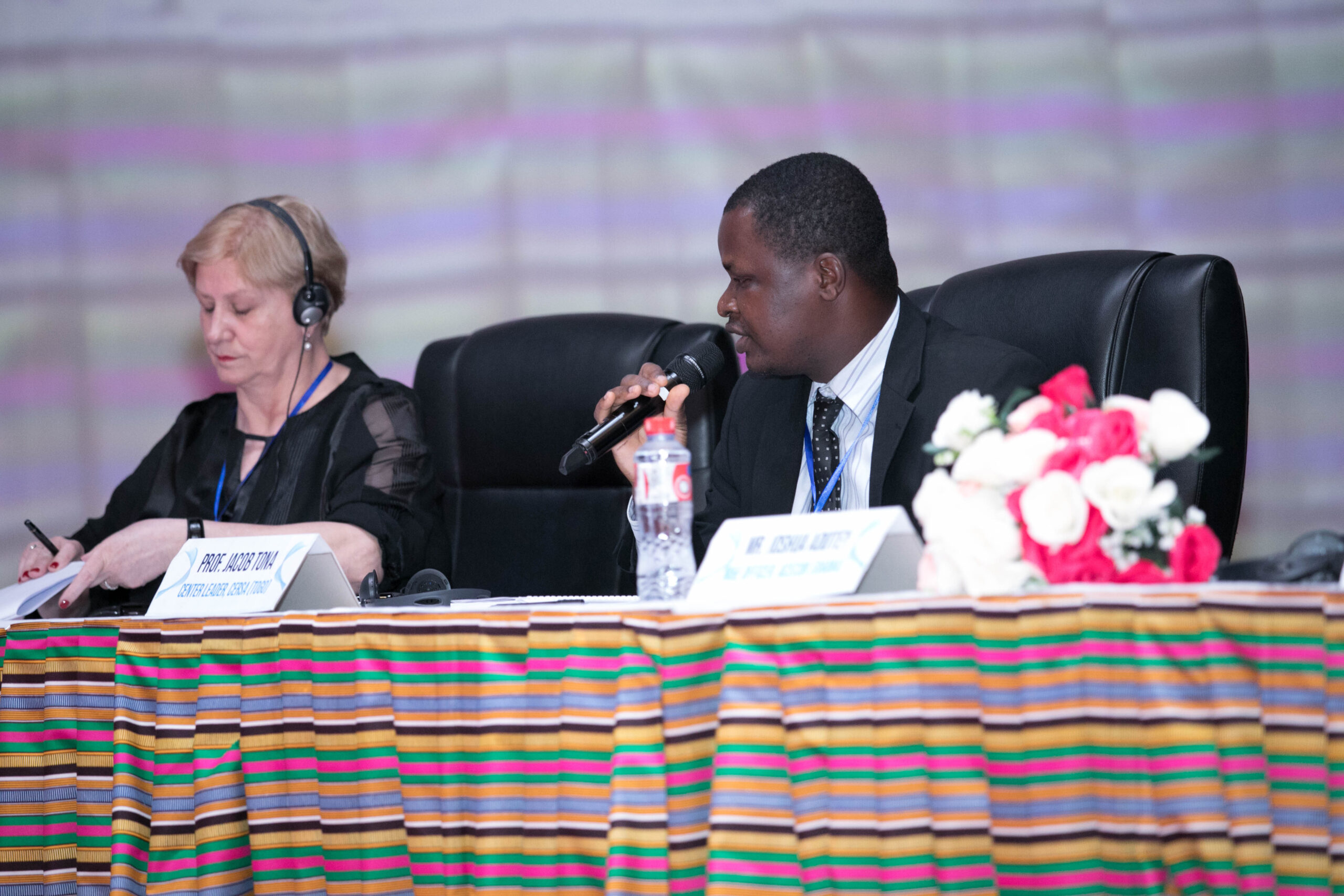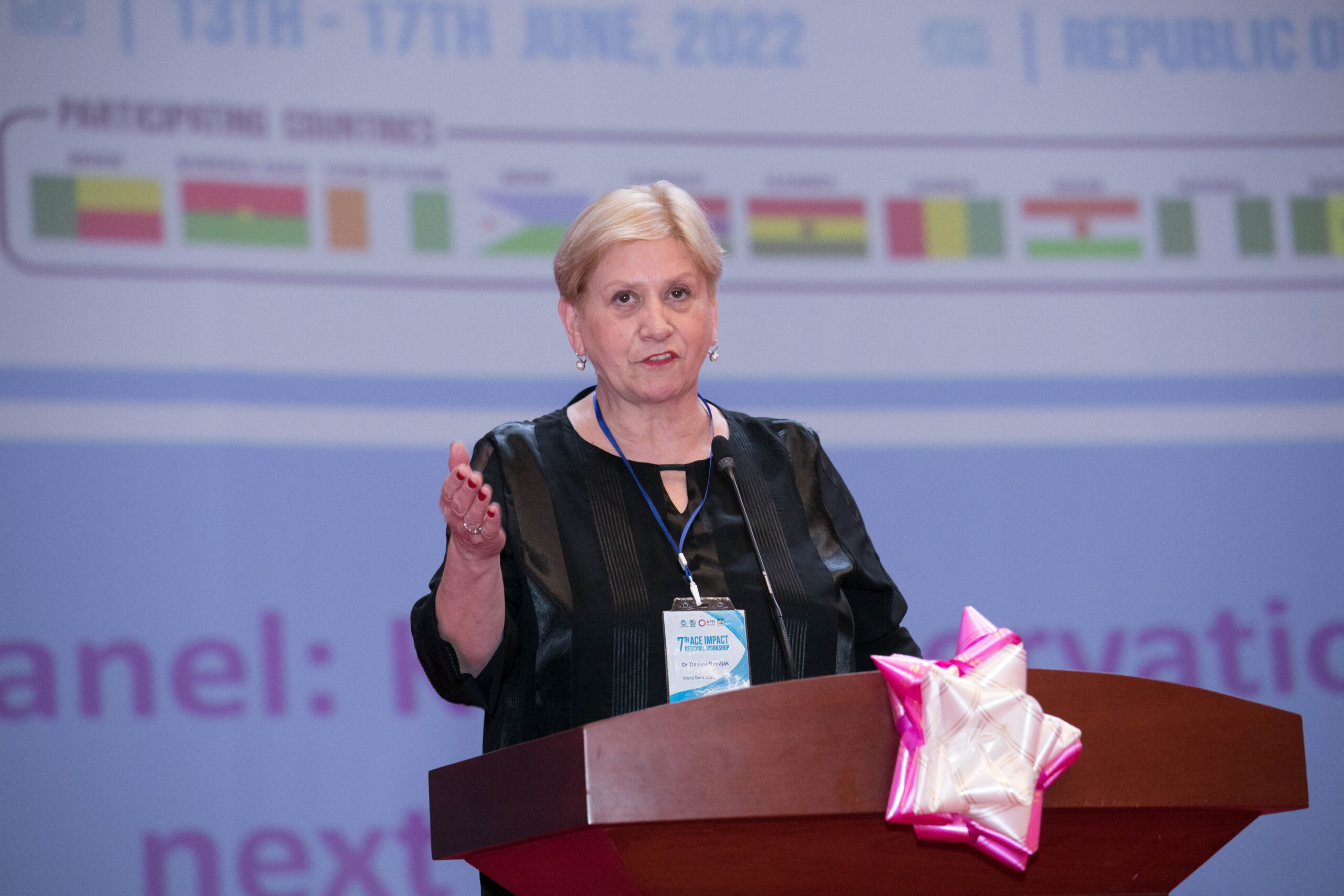A senior consultant and expert in entrepreneurship and innovation at the World Bank, Dr. Danica Ramljak underscored the critical role innovation and entrepreneurship play in advancing the economic growth of countries. Speaking during the session on entrepreneurship and innovation, at the 7th ACE Impact regional workshop held in Cotonou Benin, she called on higher education institutions to strengthen their efforts in the areas of technology transfer, development of institutional innovation and the entrepreneurship ecosystem.
The session broadly featured an interactive discussion on how the 53 Centres of Excellence are progressing with entrepreneurship and innovation, building on lessons from both within and outside the African continent.
The Disbursement Linked Indicator (DLI) 5.3 – Key Observations and Next Steps
Making a presentation on DLI 5.3 which focuses on innovation and entrepreneurship, Dr. Danica Ramljak took participants through the key targets of the implementation plan, including a focus on innovation-oriented cooperation in research infrastructures and collaboration with the private sector. Centres had earlier been given opportunities to develop implementation plans on how to accomplish the activities related to innovation and entrepreneurship as part of DLI5.3. Dr. Danika used the opportunity to provide feedback to the Centres on their applications.
She called on the centres to pay special attention to the established criteria for the review process of applications under this indicator, which included – quality background description of institutional and innovation ecosystems. Others included justification for the proposed activity and a detailed explanation of the proposed implementation plan with specific descriptions of each activity, highlighting the goals, timelines and person (s) responsible. The verification criteria and budget as well as the justification for the budget were said to be part of the criteria.
Commenting on the general results from the review process, it was mentioned that the quality of applications significantly differed, in ways which cannot be attributed to the country of origin or scientific research interest areas of the Centres. The number of improved resubmissions were also noted to have been significantly increased during the resubmission stage. Again, it was observed that the Centres were at different levels in terms of institutional innovation ecosystem.
Participants were reminded of the key roles of higher education in the areas of knowledge generation, training of skilled human resource and the development of technology that can be transferred to industry among others. Based on these roles, including others such as undertaking research for industry and the development of competitive products, the session participants were encouraged to advocate and engage the authorities in their institutions and at the country levels to prioritise innovation.

They were also encouraged to measure and determine the technology readiness level of their institutions for innovation and commercialisation as this was an important step towards planning and putting measures in place to foster the readiness of their systems for full scale deployment.
Key among the recommendations towards becoming fully blown entrepreneurial and innovative institutions, the importance of having appropriate Science Technology Innovation (STI) policies in place and ensuring its effective implementation was underscored. Other recommendations outlined included – ensuring institutional capacity building for STI management and governance, the establishment of efficient models for knowledge transfer and the provision of institutional capacity building. It was also recommended that centres define their research and development priorities, develop a roadmap for research infrastructure and provide sustainable support for innovation development. Equally important to fostering innovation and entrepreneurial activities were the recommendations to attract the private sector to collaborate and invest in HEIs research and development (R&D), the need to strengthen international collaborations, a well as inform the general public about the importance of the Centres’ work.
Experience Sharing on Entrepreneurship and Innovation by Three Centres of Excellence – ACECoR, CERSA and OAU-OAK PARK
A high-level panel composed of Mr. Joshua Adotey from the Africa Centre of Excellence in Coastal Resilience (ACECoR), Ghana, Prof. Adesola Aderounmu from OAU ICT-Driven Knowledge Park, Nigeria and Dr. Edoh representing the Regional Center of Excellence on Avian Sciences (CERSA), Togo discussed key issues and shared their experiences on how to excel and meet the requirements of DLI 5.3.
Speaking on the key challenges encountered in their institutions’ ecosystems which inhibit their work in this area, CERSA identified the lack of a technology transfer office to facilitate their commercialization process, and the low marketing of results generated by the researchers. For ACECoR, there was the lack of entrepreneurship policies at the initial stage of developing the framework for the DLI. Limited engagement and collaboration between industry and the university was also a challenge, however this has been improved drastically and currently industry members are engaged closely in various ways, including in remodeling some programmes and courses. ACECoR highlighted how the support from university authorities, especially the vice-chancellor helped them overcome some of their challenges, leading to the strengthening of their technology office.
For OAU-OAK PARK, the focus on developing the skills of students had been prime on their agenda, however the development of IT entrepreneurs had not been prioritized, thus they identified the need to train the youth in this area for wealth creation and capacity development among others. Having done all these however, the key challenge of their inability to attract investors to fund the innovations and products including spin off institutions, remains. Another challenge faced related to intellectual property rights issues which come up as they partner with industry in generating some innovations. Participants were told that the centre has put in place pragmatic measures to overcome these challenges, including training students to develop business plans, providing seed funding for the innovations, engaging the University’s intellectual property rights office from the start of discussions with industry players.
Speaking on how to be successful in innovation, the experienced panelists advised centres to strengthen their engagement with the private sector, implement measures to motivate their researchers, and to develop and implement institutional manuals and procedures to guide various processes. Again, the Centres were encouraged to ensure that there is a fully functional entrepreneurial ecosystem which has people with the right skills, a pool of investors supporting their research work, a ready market to uptake developed innovations and the sensitisation of stakeholders to embrace entrepreneurship. Additionally, commitment from institutional authorities toward innovation and entrepreneurship was said to be key, just like having an Intellectual Property Technology Transfer Office (IPPTO) and a sustainability plan.

Centre’s Impact on University Systems
Tackling the discussion on how Centre’s activities impact and strengthen the university system, numerous contributions were shared. Among these, ACECoR for instance is engaging the University’s Directorate of Research, Innovation and Consultancy (DRIC) in operationalising the formulation on Innovation, thereby building capacity in the team. It is also creating an enabling environment for the service incubation centre of the institution.
Similarly, OAU- OAK is supporting capacity building of the institution’s Business Resource Centre, linking this centre to industry players and also collaborating with them to organise technology focused conferences. Again, some spin off companies from the centre’s activities now serve as places for practical skill acquisition for the University’s students, through internships.
Leveraging ACE Impact Project to strengthen innovation and entrepreneurship in African HEIs
Following a question-and-answer session from participants, Dr. Danica Ramljak wrapped up the session by calling on the centres to leverage the opportunity presented by the project to improve their institutions’ innovation and entrepreneurship ecosystem. Centres were encouraged to for instance draw on the project to beef up capacity in their technology transfer offices, if they are understaffed. They were urged to strengthen partnerships among themselves as centres and with other international partners, advocate for the development and implementation of Intellectual Property Policies among others.
Finally, the centres of excellence were called upon to lobby and engage their ministries and universities to recognise innovation and entrepreneurship activities of researchers as part of career progress and promotion indicators, and equally work hard to bring in money from other external sources to support innovation and entrepreneurship as these are key ingredients to economic growth of countries across the continent.
Written By: Mrs. Felicia Nkrumah Kuagbedzi, Senior Communications and Publications Officer, AAU
